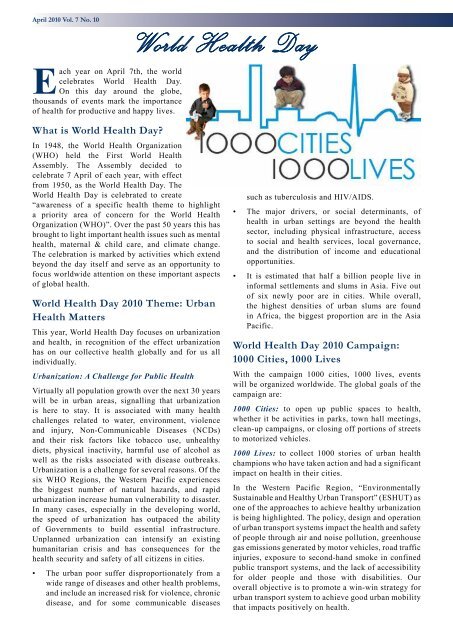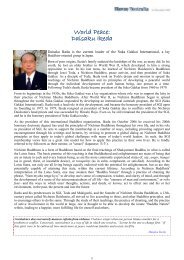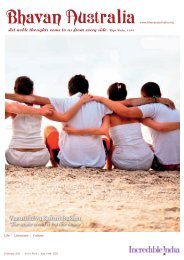'The whole world is but one family' - Bharatiya Vidya Bhavan Australia
'The whole world is but one family' - Bharatiya Vidya Bhavan Australia
'The whole world is but one family' - Bharatiya Vidya Bhavan Australia
Create successful ePaper yourself
Turn your PDF publications into a flip-book with our unique Google optimized e-Paper software.
April 2010 Vol. 7 No. 10<br />
Each year on April 7th, the <strong>world</strong><br />
celebrates World Health Day.<br />
On th<strong>is</strong> day around the globe,<br />
thousands of events mark the importance<br />
of health for productive and happy lives.<br />
What <strong>is</strong> World Health Day?<br />
In 1948, the World Health Organization<br />
(WHO) held the First World Health<br />
Assembly. The Assembly decided to<br />
celebrate 7 April of each year, with effect<br />
from 1950, as the World Health Day. The<br />
World Health Day <strong>is</strong> celebrated to create<br />
“awareness of a specific health theme to highlight<br />
a priority area of concern for the World Health<br />
Organization (WHO)”. Over the past 50 years th<strong>is</strong> has<br />
brought to light important health <strong>is</strong>sues such as mental<br />
health, maternal & child care, and climate change.<br />
The celebration <strong>is</strong> marked by activities which extend<br />
beyond the day itself and serve as an opportunity to<br />
focus <strong>world</strong>wide attention on these important aspects<br />
of global health.<br />
World Health Day 2010 Theme: Urban<br />
Health Matters<br />
Th<strong>is</strong> year, World Health Day focuses on urbanization<br />
and health, in recognition of the effect urbanization<br />
has on our collective health globally and for us all<br />
individually.<br />
Urbanization: A Challenge for Public Health<br />
Virtually all population growth over the next 30 years<br />
will be in urban areas, signalling that urbanization<br />
<strong>is</strong> here to stay. It <strong>is</strong> associated with many health<br />
challenges related to water, environment, violence<br />
and injury, Non-Communicable D<strong>is</strong>eases (NCDs)<br />
and their r<strong>is</strong>k factors like tobacco use, unhealthy<br />
diets, physical inactivity, harmful use of alcohol as<br />
well as the r<strong>is</strong>ks associated with d<strong>is</strong>ease outbreaks.<br />
Urbanization <strong>is</strong> a challenge for several reasons. Of the<br />
six WHO Regions, the Western Pacific experiences<br />
the biggest number of natural hazards, and rapid<br />
urbanization increase human vulnerability to d<strong>is</strong>aster.<br />
In many cases, especially in the developing <strong>world</strong>,<br />
the speed of urbanization has outpaced the ability<br />
of Governments to build essential infrastructure.<br />
Unplanned urbanization can intensify an ex<strong>is</strong>ting<br />
humanitarian cr<strong>is</strong><strong>is</strong> and has consequences for the<br />
health security and safety of all citizens in cities.<br />
• The urban poor suffer d<strong>is</strong>proportionately from a<br />
wide range of d<strong>is</strong>eases and other health problems,<br />
and include an increased r<strong>is</strong>k for violence, chronic<br />
d<strong>is</strong>ease, and for some communicable d<strong>is</strong>eases<br />
World Health Day<br />
such as tuberculos<strong>is</strong> and HIV/AIDS.<br />
• The major drivers, or social determinants, of<br />
health in urban settings are beyond the health<br />
sector, including physical infrastructure, access<br />
to social and health services, local governance,<br />
and the d<strong>is</strong>tri<strong>but</strong>ion of income and educational<br />
opportunities.<br />
• It <strong>is</strong> estimated that half a billion people live in<br />
informal settlements and slums in Asia. Five out<br />
of six newly poor are in cities. While overall,<br />
the highest densities of urban slums are found<br />
in Africa, the biggest proportion are in the Asia<br />
Pacific.<br />
World Health Day 2010 Campaign:<br />
1000 Cities, 1000 Lives<br />
With the campaign 1000 cities, 1000 lives, events<br />
will be organized <strong>world</strong>wide. The global goals of the<br />
campaign are:<br />
1000 Cities: to open up public spaces to health,<br />
whether it be activities in parks, town hall meetings,<br />
clean-up campaigns, or closing off portions of streets<br />
to motorized vehicles.<br />
1000 Lives: to collect 1000 stories of urban health<br />
champions who have taken action and had a significant<br />
impact on health in their cities.<br />
In the Western Pacific Region, “Environmentally<br />
Sustainable and Healthy Urban Transport” (ESHUT) as<br />
<strong>one</strong> of the approaches to achieve healthy urbanization<br />
<strong>is</strong> being highlighted. The policy, design and operation<br />
of urban transport systems impact the health and safety<br />
of people through air and no<strong>is</strong>e pollution, greenhouse<br />
gas em<strong>is</strong>sions generated by motor vehicles, road traffic<br />
injuries, exposure to second-hand smoke in confined<br />
public transport systems, and the lack of accessibility<br />
for older people and those with d<strong>is</strong>abilities. Our<br />
overall objective <strong>is</strong> to promote a win-win strategy for<br />
urban transport system to achieve good urban mobility<br />
that impacts positively on health.









